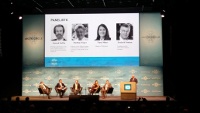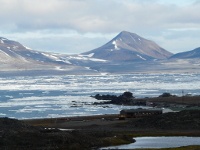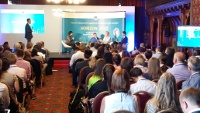News
- Details
 EDU-ARCTIC & ERIS Project Manager Dr. Agata Goździk presented the EDU-ARCTIC project at the recent Arctic Circle Assembly during the breakout session "The educating of mid-latitudinal countries on climate change through art and science" on October 8th.
EDU-ARCTIC & ERIS Project Manager Dr. Agata Goździk presented the EDU-ARCTIC project at the recent Arctic Circle Assembly during the breakout session "The educating of mid-latitudinal countries on climate change through art and science" on October 8th.
Dr. Goździk shared her experience from working on the EDUSCIENCE project, which was the largest innovative project implemented in Poland in the field of mathematical and natural sciences, and talked about the ideas underlying EDU-ARCTIC.
- Details
On 27 September at White House Arctic Science Ministerial Side-Event two panel discussions with international Arctic leaders explored the role that Arctic research plays in the empowerment of Arctic communities and to inspire learning in science, technology, engineering and mathematics. The EDU-Arctic project was showcased at the event.
The online discussion surrounding the event used the hashtag #ArcticSciEd.
- Details
The Edu-Arcitc presentation was showcased at Arctic Science Ministerial Side-Event.
Organized by the Arctic Research Consortium of the United States (ARCUS), Arctic Portal, Woods Hole Research Center, Arctic 21, the PoLAR Partnership, the Consortium for Ocean Leadership, the EDU-ARCTIC consortium, the Arctic Science Ministerial Side-Event took place in Washington, th D.C. on the morning of September 27 at the ARCUS Washington DC office.
- Details
Arctic science as a vehicle for STEM Education and Citizen Empowerment.
Organized by the Arctic Research Consortium of the United States (ARCUS), Arctic Portal, Woods Hole Research Center, Arctic 21, the PoLAR Partnership, the Consortium for Ocean Leadership, the EDU-ARCTIC consortium, the Arctic Science Ministerial Side-Event will take place in Washington, th D.C. on the morning of September 27 at the ARCUS Washington DC office.
- Details
With a research vessel, brand new project tools and polar bears!
From September 16th to 19th, the EDU-ARCTIC consortium will hold a Methodological Workshop on Norway's Svalbard archipelago. The workshop will be hosted by the Institute of Geophysics PAS, the leader of the project.
This workshop comes right before the main part of the project - starting to implement the program at schools – is set to begin.
- Details
Over the past 20 years, there has been growing interest in science education in most European countries, as well as around the world. Such policies usually have a dual purpose: to promote science literacy among all young people (and even adults) and attract young people to science and the disciplines of technology in secondary and higher education, with the aim of encouraging them to move to science and technology professions and/or research-scientific careers.
- Details
What is science communication and how to perform it effectively? – over 150 project coordinators in Horizon 2020 programme were looking for answers for these questions last Sunday (24th July 2016). Manchester Town Hall hosted the Science Communication Event, organized by the European Commission. Experts from various media were advising how to tell the project story to get the audience involved.
What are the aims of the good communication?
to inform → to interest → to inspire → to activate.
- Details
Do you wonder what Hornsund Polish Polar Station and its surroundings look like? Hornsund Station is one of the places in the Arctic, where the EDU-ARCTIC program operates. Now, you may enjoy watching the newest video from this station on our website.



 This project (EDU-ARCTIC) has received funding from the European Union’s Horizon 2020 research and innovation programme under grant agreement No 710240. The content of the website is the sole responsibility of the Consortium and it does not represent the opinion of the European Commission, and the Commission is not responsible for any use that might be made of information contained.
This project (EDU-ARCTIC) has received funding from the European Union’s Horizon 2020 research and innovation programme under grant agreement No 710240. The content of the website is the sole responsibility of the Consortium and it does not represent the opinion of the European Commission, and the Commission is not responsible for any use that might be made of information contained.